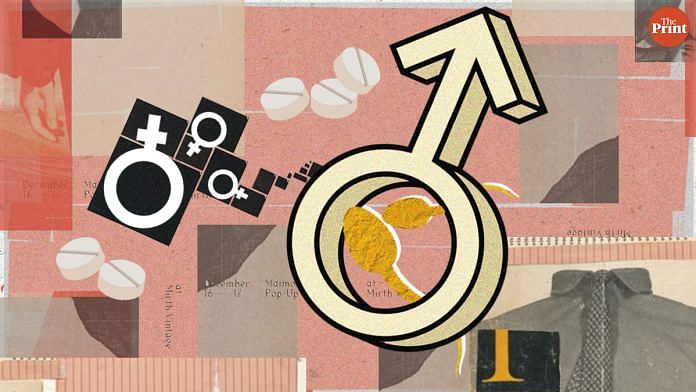A new male contraceptive pill has passed the safety and tolerability test when tried on healthy males for a month, a recent US study showed. Scientists working on it said the pill can successfully reduce sperm count while preserving libido.
ThePrint asks: Male contraceptives pills — a step towards equality or will it make women cede reproductive rights again?
Male contraceptives give greater freedom to women & relieve them of horrible side effects of the pill
 Himani Chandna
Himani Chandna
Reporter, ThePrint
Imagine: You wake up every day feeling sick or uncomfortable. And then, one day you spot mild bleeding, but your periods are not due. Another day, you feel nausea or have a headache, or you are irritable and depressed.
This is what a woman – on contraceptive pills — goes through. As terrible they may sound, these are still called ‘minor’ side effects of contraceptive pills. The chances of having a cardiac arrest or the likelihood of developing breast and cervical cancer are some of the more ‘serious’ side effects. The list of side effects goes on.
Still, in the last one year, chemists in India sold over one crore strips of pills for the value of Rs 97 crore, as per data by the All India Organisation of Chemists and Druggists, a chemists lobby.
Women must consider that these birth control pills are prescribed by doctors not because they are entirely safe, but because they are just safer than being pregnant.
First, let’s share the financial and health-related brunt of contraceptive pills. Share life later.
Contraceptive pills for men would bring equality into a couple’s decision-making process.
And certainly, it won’t make women cede her reproductive rights. Having a child is, generally, a consensual decision. Rather, male contraceptives give greater authority to women to protect their own bodies from the unnecessary wear and tear caused by hormonal fluctuations.
And the reproductive autonomy will anyway remain mostly with her, because she is the one capable of carrying and delivering a child.
Society will resist male contraceptives because of the toxic equivalence drawn between virility and manhood
 Shahbaz Ansar
Shahbaz Ansar
Journalist, ThePrint
I know many couples who prefer not using a condom because of the fear of losing out on pleasure. For them, the male contraceptive pill is a great invention. In sexual relationships, the woman has to bear the brunt of the side effects of oral contraceptives, as well as the expenditure required to procure them. The man, however, gets to enjoy sex without worrying about its consequences.
Since women get pregnant, it has been unfairly assumed for centuries that their bodies are the ones that must bear the burden of medical policing. Contraceptives helped return sexual and reproductive rights back to women, and any further advancements in this sector are only bound to increase freedom of choice.
The male contraceptive pill will help heterosexual couples share side-effects and responsibilities equally.
As per reports, the new contraceptive will decrease the male sperm-count for a certain period of time to prevent pregnancy. Considering the toxic equivalence drawn between a man’s virility and the strength of his swimmers, which in turn fuels notions of masculinity and manhood, society may be resistant to adopting these new contraceptives — which is what makes them all the more important. Male contraceptives push against these patriarchal notions — using them will help effect a change in mindset.
Also read: World Contraception Day: As more women opt for morning-after pills, doctors urge caution
The reproductive burden of sex is only on one sex, male contraceptives are unlikely to change that
 Neera Majumdar
Neera Majumdar
Journalist, ThePrint
Most people don’t know that both female and male oral contraceptives were being tested for market production around the same time — the 1950s. While the US FDA approved the female ones in the 1960s, the male ones never made it past the testing lab.
Every few years, we hear of the male contraceptive pill getting closer to passing clinical trials. In 2016, the male pill did not pass the test because “the risks to the study participants outweighed the potential benefits”. What were these risks? Mood changes, increase in weight and problems with libido. Women for decades have chosen these side effects, and more, just so they could be in charge of their reproductive health. These were hard-earned rights and a way to reclaim our bodies. Because let’s accept it — the burden of sex is only on one sex. Stealthing, when a man without consent removes a condom during sex, coercion, marital rape and sexual assault are a reality in this country, among couples and in every family.
Now that the male oral pill has passed the safety test and can become a reality in a few years, women may be forced to give up some rights and certainty again.
Condoms are still our best option, because male and female contraceptives can’t prevent STDs
 Anusuya Som
Anusuya Som
Intern, ThePrint
Sex has been seen as patriarchal in nature, and women have mostly been at the giving end and rarely seen as equals. We have all heard of or been part of relationships where women have been forced to use the morning-after pill because their male partners did not like using condoms as it reduces pleasure.
Equality in sex can only be achieved when both partners play it safe and the responsibility of the consequence is not thrust on one. It doesn’t matter whether it is a male or female contraceptive pill. What matters is whosoever it taking it should tell their partner and there should be consent during sex.
The other factor which is often neglected, is the prevention of STDs. We cannot overlook the fact that these pills have no control over the transmission of sexually transmitted diseases, and hence condom is still the best option. One, because it hardly has any sight effects (although some people do have a latex allergy, which is very rare) and two, it is still the safest contraceptive we have.
By Neera Majumdar, journalist at ThePrint.



